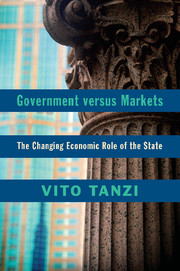Book contents
- Frontmatter
- Contents
- Preface
- PART ONE THE ECONOMIC ROLE OF THE STATE
- PART TWO HISTORICAL REVIEW
- 2 The Role of the State in the Pre–World War II Period
- 3 Forces That Changed the Role of the State
- 4 Growth of Public Spending and Taxation in the 20th Century
- 5 The Role of the State in Social Protection
- 6 Globalization and Public Spending
- PART THREE THEORETICAL AND ANALYTICAL ISSUES
- PART FOUR THE OUTCOME OF STATE INTERVENTION
- PART FIVE ON THE ECONOMIC ROLE OF THE STATE IN THE FUTURE
- Notes
- Index
- References
5 - The Role of the State in Social Protection
Historical Landmarks
Published online by Cambridge University Press: 07 October 2011
- Frontmatter
- Contents
- Preface
- PART ONE THE ECONOMIC ROLE OF THE STATE
- PART TWO HISTORICAL REVIEW
- 2 The Role of the State in the Pre–World War II Period
- 3 Forces That Changed the Role of the State
- 4 Growth of Public Spending and Taxation in the 20th Century
- 5 The Role of the State in Social Protection
- 6 Globalization and Public Spending
- PART THREE THEORETICAL AND ANALYTICAL ISSUES
- PART FOUR THE OUTCOME OF STATE INTERVENTION
- PART FIVE ON THE ECONOMIC ROLE OF THE STATE IN THE FUTURE
- Notes
- Index
- References
Summary
Introduction
In previous chapters we discussed the growth of public spending and of taxes that took place over the past century, in the so-called advanced countries. We also outlined some of the factors that contributed to that growth. The public spending and the taxes that financed the new social activities started to be justified not on grounds of assisting the very poor, as in the past, but on grounds that the social spending provided protection to increasing shares and growing categories of the population against risks that had economic consequences for the citizens. The governments' programs, financed by the public spending, were generally assumed to make it easier for citizens to cope with the economic risks of modern living. It was thus argued that they increased the welfare of the citizens.
This risk-focused justification was different from the one used in the past to support assistance to the very poor, as for example with various programs of assistance in France, Italy, and other European countries, or with the English Poor Law of 1601. In Islamic countries the “Zakat,” one of the five Pillars of Islam, had been for a long time a “social tax” that provided resources to assist the elderly, the widows, the orphans, and the disabled, all individuals that could not take care of themselves, in those countries (Crone, 2005).
- Type
- Chapter
- Information
- Government versus MarketsThe Changing Economic Role of the State, pp. 107 - 128Publisher: Cambridge University PressPrint publication year: 2011



